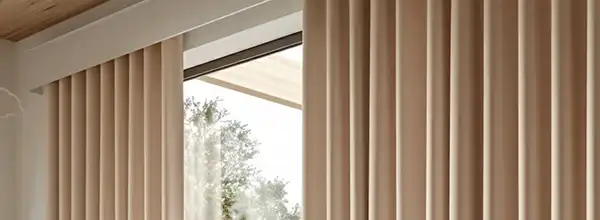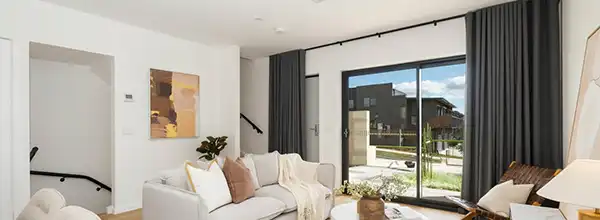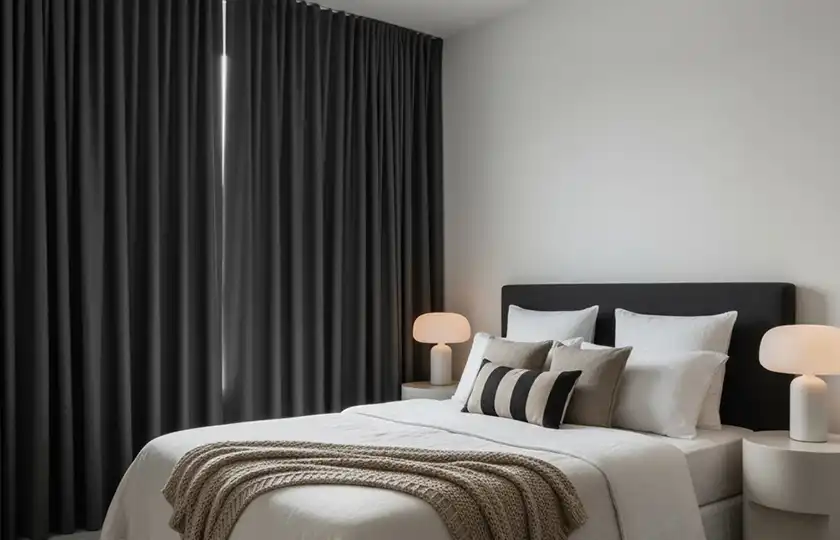Blockout vs Thermal Curtains:
Which One Is Right for Your Home?
When choosing curtains for your Canberra home, it’s easy to get confused between blockout and thermal curtains, especially during the colder season when most people are looking for ways to keep the warmth in.
While they may look similar, they serve different functions, and sometimes, they can be combined. In this guide, we’ll explain the differences, pros and cons, and help you decide which type is best for your space.
What Are Blockout Curtains?
Blockout curtains are specially designed to block light from entering a room. These curtains typically use a tightly woven fabric or a special opaque lining, usually made from acrylic or rubber, that prevents light from passing through. The result is a curtain that can darken a room by 99% or more, depending on quality and fit.
Some blockout curtains are made with a coated lining on the back of a decorative fabric, while others use multiple layers of fabric sewn together to achieve full light block.
When Should You Use Blockout Curtains?
Blockout curtains are perfect for areas where darkness, privacy, or glare reduction is important. Here are some common uses:
- Bedrooms: Promote better sleep, especially for shift workers or those sensitive to light.
- Nurseries: Help babies nap during daylight hours.
- Media Rooms: Reduce screen glare for better viewing experiences.
- Street-Facing Windows: Enhance privacy, especially at night.
In addition to darkening a room, blockout curtains can also offer some insulation and noise reduction benefits, thanks to their thickness.
How Do Blockout Curtains Work?
Blockout curtains work by using an opaque lining that completely prevents light from passing through the fabric. The effectiveness of these curtains depends not only on the material but also on how well they’re installed. For maximum performance, they should cover the full width and height of the window and extend slightly beyond the frame to reduce light gaps.
Some high-quality blockout curtains can also help regulate indoor temperatures slightly, but their main function is light exclusion, not insulation.

What Are Thermal Curtains?
Thermal curtains are designed to regulate temperature in your home by providing an added layer of insulation to your windows. They are constructed with a specialised lining, often silicon backed polyester or acrylic foam, felt, or reflective backing, that reduces the transfer of heat between your windows and the room.
These curtains don’t always block out light unless combined with a blockout lining, so their primary function is temperature control.
When Should You Use Thermal Curtains?
Thermal curtains are an excellent choice in homes or rooms where energy efficiency and temperature stability are key. Common use cases include:
- Living Areas: Maintain comfort and lower heating/cooling costs.
- Bedrooms: Reduce the chill in winter and heat in summer.
- Older Homes: Provide insulation where wall and window insulation is lacking.
- Eco-Conscious Households: Reduce carbon footprint through energy savings.
These curtains help create a more consistent indoor climate while reducing reliance on air conditioning or heating.
These curtains don’t always block out light unless combined with a blockout lining, so their primary function is temperature control.
How Do Thermal Curtains Work?
Thermal curtains use one or more insulating layers to limit the flow of heat through your windows. In winter, they trap warm air inside the room and reduce heat loss. In summer, they block external heat from coming in, especially helpful on windows that receive direct sunlight.
The insulation value depends on the type and thickness of the lining and how well the curtain fits around the window. Some thermal curtains may also include reflective surfaces that bounce heat away from the window.

Thermal vs Blockout: What Are the Differences?
| Feature | Blockout Curtains | Thermal Curtains |
|---|---|---|
| Primary Purpose | Light control and privacy | Temperature regulation |
| Light Blocking | Up to 100% | Varies (some are semi-blockout) |
| Energy Efficiency | Moderate insulation | High insulation value |
| Noise Reduction | Yes, due to heavy fabric | Yes, varies with material thickness |
| Material | Opaque lining (e.g. acrylic, rubber) | Insulating lining (e.g. foam, felt) |
| Best For | Bedrooms, nurseries, home cinemas | Living rooms, drafty windows, energy saving |
What Are the Pros and Cons of Thermal Curtains?
| Pros | Cons |
|---|---|
| Improve energy efficiency by reducing heat transfer | May not fully block out light unless combined with blockout lining |
| Keeps homes warmer in winter and cooler in summer | Bulkier and heavier than standard curtains |
| Helps reduce power bills | Insulation effectiveness depends on curtain fit and quality |
| Provides some noise insulation | May not suit all interior styles due to thickness |
| Eco-friendly: reduces reliance on heating/cooling systems | Can be more expensive than regular curtains |
What Are the Pros and Cons of Blockout Curtains?
| Pros | Cons |
|---|---|
| Blocks out up to 100% of light | May trap heat in summer unless thermally lined |
| Excellent for improving sleep quality | Can make rooms feel too dark during the day |
| Offers strong privacy, especially at night | Heavier fabric may require reinforced curtain rods |
| Protects furniture and flooring from UV damage | May limit natural light and airflow |
| Reduces screen glare in media rooms | Offers only moderate insulation without thermal lining |
Can We Do Both?
Absolutely. Many modern curtain products are designed to offer both blockout and thermal benefits. These are often referred to as thermal blockout curtains or energy-efficient blockout curtains.
They combine a decorative outer fabric with both a thermal lining and a light-blocking layer, giving you the full suite of advantages:
- Total darkness for better sleep or screen viewing
- Reduced heat loss in winter and heat gain in summer
- Increased privacy and noise reduction
- Potential energy savings over time
When choosing curtains, be sure to check the product specifications. Not all blockout curtains are thermal, and not all thermal curtains are blockout. If you want both functions, look for products that clearly state both features, or speak with our Canberra curtain experts for tailored advice.

Your Canberra Curtain Specialist
At Aurora Window Furnishings, we offer a wide range of high-quality thermal and blockout curtains to suit every room, style, and budget. Whether you’re looking to keep your home cooler in summer, create the perfect sleep environment, or simply upgrade your space with custom-made curtains, our expert team is here to help. We also provide professional installation, so you can enjoy a seamless finish and optimal performance.
Ready to transform your windows? Schedule a free consultation with Aurora today and let’s bring comfort, style, and functionality into your home.











